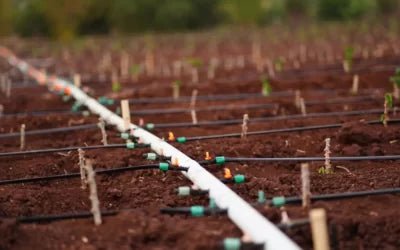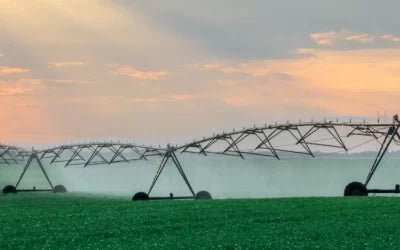What Is Drip Irrigation?
Drip irrigation is a method of water supply, referred to as irrigation, which precisely and slowly emits water directly to plant roots. The primary intent of drip irrigation is to control water distribution to reduce waste and sufficiently meet the requirements of plants and crops, such as increased growth and crop yield. Because drip irrigation distributes water in a controlled manner, it avoids overwatering from occurring. Overwatering can present several complications, such as loss of nutrients and soil erosion — both of which can negatively affect essential plant functions, such as photosynthesis.
How Does Drip Irrigation Work?
Drip irrigation offers a straightforward and highly effective solution to plant maintenance. It uses a system of purpose-made drippers that control the flow rate of water, which is distributed to the root zone of plants and crops so that a sufficient amount of water is absorbed.
Solar Pumps for Drip Irrigation
You can elevate the efficiency of a drip irrigation system by integrating high efficiency photovoltaic (PV) panels, which connect to a solar pump system. The type of solar pump system depends on your water requirements as mentioned below:
Large Scale Commercial Operations
In large-scale commercial agricultural operations, the implementation of a LORENTZ solar hybrid pump system presents a robust and dependable solution to power a drip irrigation network efficiently. By harnessing the dual advantages of solar energy by day and diesel by night, hybrid pumps systems offer the reliability needed to sustain the demands of expansive agricultural landscapes.
Solar hybrid pumps for drip irrigation are both more environmentally friendly than most traditional methods and significantly more cost-effective, as it partially eliminates dependency on grid electricity and pollutant fuels.
Large domestic / small scale commercial operations
For large domestic or small scale commercial operations, the LORENTZ PS2 solar pump system can act as a great solution. Whist the LOERNTZ PS2 does not have full hybrid blending capabilities, it is capable of power switching from solar to an alternate back up power source if required.
Smaller domestic uses
For hobby farmers and other smaller domestic uses like irrigating veggie patches, domestic trees and a small number of animals (such as horses), LORENTZ “S” is the perfect solution.
To find out more about what pump would work best for your drip irrigation requirements, speak to one of our accredited expert dealers across Australia.
10 Benefits of Drip Irrigation
Environmentally Friendly
Drip irrigation systems are notably environmentally friendly because they precisely deliver water to plant root zones which works to minimise wasted water effectively.
In fact, drip irrigation is advocated to be significantly more sustainable than other irrigation systems, such as flood irrigation, which loses around 50% of water on average. When compared to other irrigation systems, drip irrigation also uses a significantly lower pressure system, and requires a lower level of energy to function.
Minimised Chance of Disease Spread
Due to the targeted approach of drip irrigation, plant roots receive their required water intake, while foliage is kept dry. This minimises fungal infections and pathogens from spreading across crops, resulting in healthier plants.
Cost Effective
Drip irrigation is highly cost effective in the long-run because it requires less water to maintain plants and crops, meaning you will experience lower water costs. By integrating a solar pump into your drip irrigation system, you can further reduce your expenses as solar energy presents zero fuel costs.
Adjustable Water Flow
The drippers used in drip irrigation systems can be adjusted to ensure the correct flow rate is being supplied to each plant. To ensure this, the flow rate of a drip irrigation system can be measured in litres per hour (LPH), to understand how quickly water is emitted to each plant.
This enables crop farmers to meet the needs of different plants and accurately supply them with their required intake of water.
Encourages High Crop Yield and Profitability
Maximised crop yield is salient to the success of farmers as it paves the way for profitability. Because drip irrigation controls the volume of water emitted to crops, it prevents nutrient run off. This means plant roots consistently receive optimal root moisture and nutrients required to flourish and grow.
Minimises Soil Erosion
Water runoff can cause soil erosion, which presents several threats to crop yield. For instance, soil erosion means nutrient-rich and fertile soil is washed away, which will inevitably affect the growth of plants and reduce how productive land is for agriculture.
Because drip irrigation controls the amount of water released, runoff is highly unlikely making soil erosion non-existent, so your land can prosper.
Enhanced Nutrient Control
You can improve and control the amount of nutrients your plants receive by integrating fertilisers into your system (known as fertigation). This enables roots to receive valuable nutrients directly to the root zone through the drip irrigation system.
Improved Crop Quality
Drip irrigation not only increases crop yield but also improves the quality of crops. This is because irrigation uses a targeted approach, which ensures plants receive all the water and nutrients they need to prosper.
For instance, drip irrigation ensures moisture levels are stable and consistent, minimising stress on plant roots. This leads to healthier and better quality produce, such as fruit and grain, which can significantly increase the value of crops.
Flexible Scheduling
Drip irrigation systems enable flexible water scheduling because agriculturalists can program them to release water at specific times, ensuring plants receive the correct intake of water all year round, which is useful during dryer seasons and irregular patterns of rainfall.
Flexible irrigation scheduling is particularly helpful for agriculturalists who live far from their crops or have busy lifestyles, as they are automated.
Improved Accessibility for Farmers
Farmers who manage large crop acreages, and other agriculturists who don’t have constant access to their garden particularly favour solar pumps for drip irrigation. This is because they can remotely control them to pump a specific volume of water through irrigation systems automatically, ensuring plants receive a consistent flow of hydration and nutrients.
A Final Thought…
Drip irrigation is among the most sustainable and efficient agricultural watering systems to date, which present several attractive benefits. Its positive impact on water efficiency and crop growth promotes maximised crop yield while saving time and money.
Running a drip irrigation system in conjunction with solar pumps can elevate the overall function and efficiency of the system, making solar pumps an attractive choice for farmers who irrigate crops in Australia. Running a drip irrigation system with a solar pump is also the most environmentally friendly option when compared to alternative pumps, such as diesel, petrol or even mains power.
If you’re an agriculturalist interested in switching to drip irrigation and solar water pumps, find your nearest dealer and discover how you can improve your farming systems.







